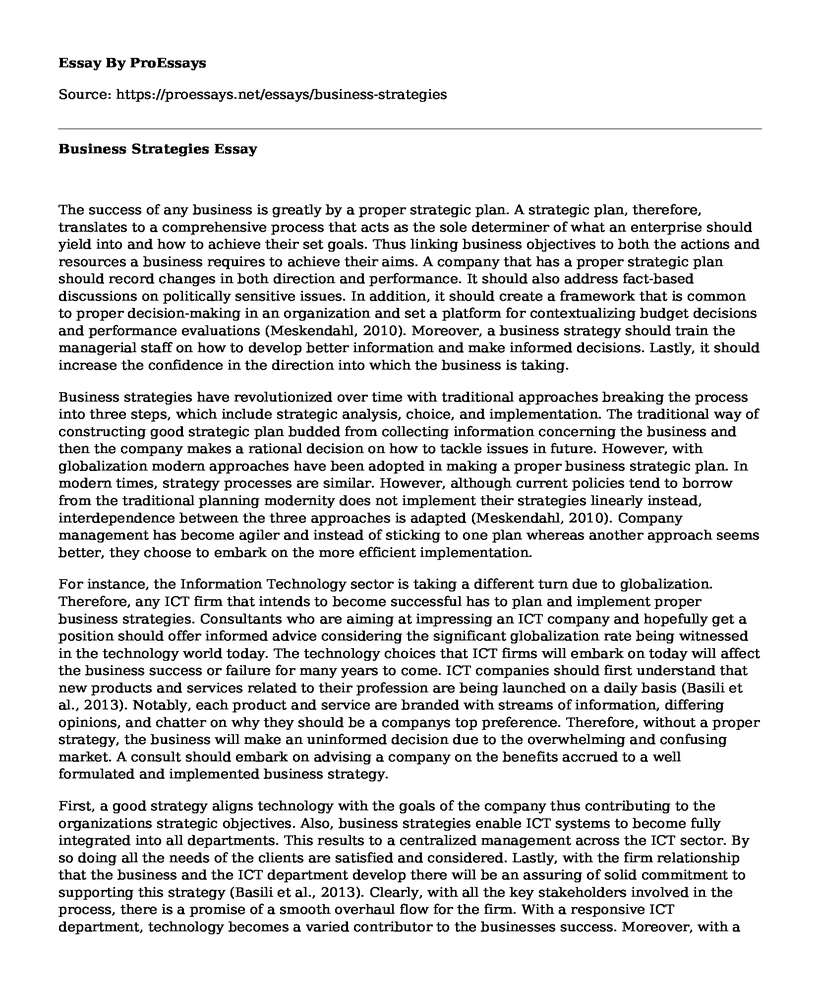The success of any business is greatly by a proper strategic plan. A strategic plan, therefore, translates to a comprehensive process that acts as the sole determiner of what an enterprise should yield into and how to achieve their set goals. Thus linking business objectives to both the actions and resources a business requires to achieve their aims. A company that has a proper strategic plan should record changes in both direction and performance. It should also address fact-based discussions on politically sensitive issues. In addition, it should create a framework that is common to proper decision-making in an organization and set a platform for contextualizing budget decisions and performance evaluations (Meskendahl, 2010). Moreover, a business strategy should train the managerial staff on how to develop better information and make informed decisions. Lastly, it should increase the confidence in the direction into which the business is taking.
Business strategies have revolutionized over time with traditional approaches breaking the process into three steps, which include strategic analysis, choice, and implementation. The traditional way of constructing good strategic plan budded from collecting information concerning the business and then the company makes a rational decision on how to tackle issues in future. However, with globalization modern approaches have been adopted in making a proper business strategic plan. In modern times, strategy processes are similar. However, although current policies tend to borrow from the traditional planning modernity does not implement their strategies linearly instead, interdependence between the three approaches is adapted (Meskendahl, 2010). Company management has become agiler and instead of sticking to one plan whereas another approach seems better, they choose to embark on the more efficient implementation.
For instance, the Information Technology sector is taking a different turn due to globalization. Therefore, any ICT firm that intends to become successful has to plan and implement proper business strategies. Consultants who are aiming at impressing an ICT company and hopefully get a position should offer informed advice considering the significant globalization rate being witnessed in the technology world today. The technology choices that ICT firms will embark on today will affect the business success or failure for many years to come. ICT companies should first understand that new products and services related to their profession are being launched on a daily basis (Basili et al., 2013). Notably, each product and service are branded with streams of information, differing opinions, and chatter on why they should be a companys top preference. Therefore, without a proper strategy, the business will make an uninformed decision due to the overwhelming and confusing market. A consult should embark on advising a company on the benefits accrued to a well formulated and implemented business strategy.
First, a good strategy aligns technology with the goals of the company thus contributing to the organizations strategic objectives. Also, business strategies enable ICT systems to become fully integrated into all departments. This results to a centralized management across the ICT sector. By so doing all the needs of the clients are satisfied and considered. Lastly, with the firm relationship that the business and the ICT department develop there will be an assuring of solid commitment to supporting this strategy (Basili et al., 2013). Clearly, with all the key stakeholders involved in the process, there is a promise of a smooth overhaul flow for the firm. With a responsive ICT department, technology becomes a varied contributor to the businesses success. Moreover, with a confident ICT department, the company can manage entailed programs, budgets, and projects where in turn the good benefits are produced. With a qualified ICT consultant, a company can attain all the accrued benefits.
References
Basili, V. R., Heidrich, J., Lindvall, M., Munch, J., Regardie, M., Rombach, D., ... &
Trendowicz, A. (2013). Linking software development and business strategy through measurement. arXiv preprint arXiv:1311.6224.
Meskendahl, S. (2010). The influence of business strategy on project portfolio management and
its success conceptual framework. International Journal of Project Management, 28(8), 807-817.
Cite this page
Business Strategies. (2021, Mar 09). Retrieved from https://proessays.net/essays/business-strategies
If you are the original author of this essay and no longer wish to have it published on the ProEssays website, please click below to request its removal:
- Thomas Cook Tours Company and High-Performance Management Paper Example
- Dual Identity and Whistleblowing Essay Example
- The Culture of Change and Using Data and Inquiry - Essay Sample
- Maximizing Growth: Analyzing Internal & External Environments at Kelly Services
- Paper Example on Garibaldi: A Firm Decision Maker for Italian Freedom
- Essay Example on Evidence-Based Decision-Making: Maximizing Favorable Outcomes
- Paper Example on Organizational Culture: Its Impact on Workplace Norms & Behaviour







